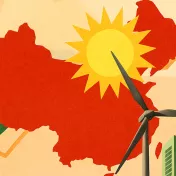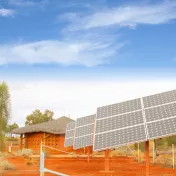South Africa is the only African country in the G20. It is challenged by a slowing, energy intensive economy, an enormous stock of ageing infrastructure in coal and very high inequality. For dealing with these challenges, South Africa needs to change its development strategy. Political momentum within the G20 could help to break the fossil fuel inertia.
South Africa features the nations with the highest GDP on the African continent. At the same time, it has the lowest GDP and the highest income inequality amongst the G20. The country’s electricity sector emits the most GHG within the G20, and 80% of the country’s total GHG emissions come from the energy sector. Consequently, climate policy is very much focused on energy transformation – especially on coal, which provides more than 90% of the country’s electricity.
South Africa needs a well-designed development strategy to securing the nation’s growing energy demand through sustainable means, which ensures access to energy that can break the inequality cycle. This is as well vital for climate change adaptation.
Already in 2011, South Africa developed a comprehensive national climate change response strategy that involved all sectors of government. Yet, the strategy is not well-integrated into policy-making. After ratifying the Paris Agreement in November 2016, a more focused discussion of the execution plan of South Africa’s nationally determined contribution (NDC) took place. The country aims to cut GHG emissions to 398-614 MtCO2e from 2025 to 2030. Non-state actors consider this unachievable, given the current energy and development strategy, or underwhelming, since the target implies a 20-80% GHG emissions increase, compared to 1990 levels.
For increasing the share of renewables in the energy mix, South Africa introduced the Renewable Energy Independent Power Producer Procurement Programme (REIPPPP). The REIPPPP has been a success: Through the competitive bidding process, the cost of wind and solar dropped below the cost of coal. Yet, the REIPPPP needs to be scaled up. The share of renewables is, with 1% of total primary energy supply, still very low.
As supporting policy, the long awaited carbon tax is scheduled to be tabled in parliament this year. Due to budgetary and capacity constraints, the tax has not been implemented so far. A commitment from the G20 partners to carbon pricing could be a strong signal to help the carbon tax breakthrough.
With regards to the country’s future energy strategy (Integrated Resource Plan [IRP] 2016, still under consultation), civil society and energy experts argue that the mix proposed does not contain enough renewable energy (45% of total installed capacity with only 14% solar). Whilst reducing the use of coal to 12% of total installed capacity in 2050, natural gas and nuclear power are projected to meet the growing energy demand. The expansion of nuclear is heavily criticized. As centralized technology, it is not suited to solve energy access issues. Furthermore, it is unsustainable and more expensive than solar and wind.
In addition, investments in water-intensive nuclear and coal capacity increase South Africa’s climate change vulnerability. Being already today water-stressed country, there is urgent need for aligning energy policy with adaptation to limited freshwater supply.
The African Renewable Energy Initiative (AREI) and projects for renewable energy access under African ownership could address a range of complex challenges of the African continent. With coherent energy and adaptation strategies, South Africa could become a role-model and sustainable development leader in institutions like the African Union and the African Commission.

Lately, emissions in South Africa have de-coupled from economic growth, partly due to lower growth rates, but also because of structural changes. Transforming the economy with the existing coal-based capital stock, whilst ensuring the next phase is not nuclear, remains a major challenge.
Neoka Naidoo ist Mitglied der Nichtregierungsorganisation Climate Action Network International und vertritt ihr Heimatland Südafrika in der African Coalition for Sustainble Energy Access (ACSEA). Die Umweltwissenschaftlerin hat in nachhaltiger Entwicklung promoviert.
Links:
- Income inequality paper by HSRC: http://www.hsrc.ac.za/en/review/hsrc-review-november-2014/limitations-of-gini-index
- IRP Analysis by CSIR Energy Centre: https://www.csir.co.za/sites/default/files/Documents/IRP%20Feedback%20-%20CSIR%20-%207Dec2016_v2.pdf
- G20 Brown to Green Report by Climate Transparency: http://www.climate-transparency.org/wp-content/uploads/2016/09/Brown-to-Green-Assessing-the-G20-transition-to-a-low-carbon-economy.pdf
- Press Statement by South African Treasury: http://www.gov.za/speeches/g20-finance-ministers-20-mar-2017-0000
- With financial support by Stiftung Mercator. The Author and Germanwatch are responsible for the content. -



